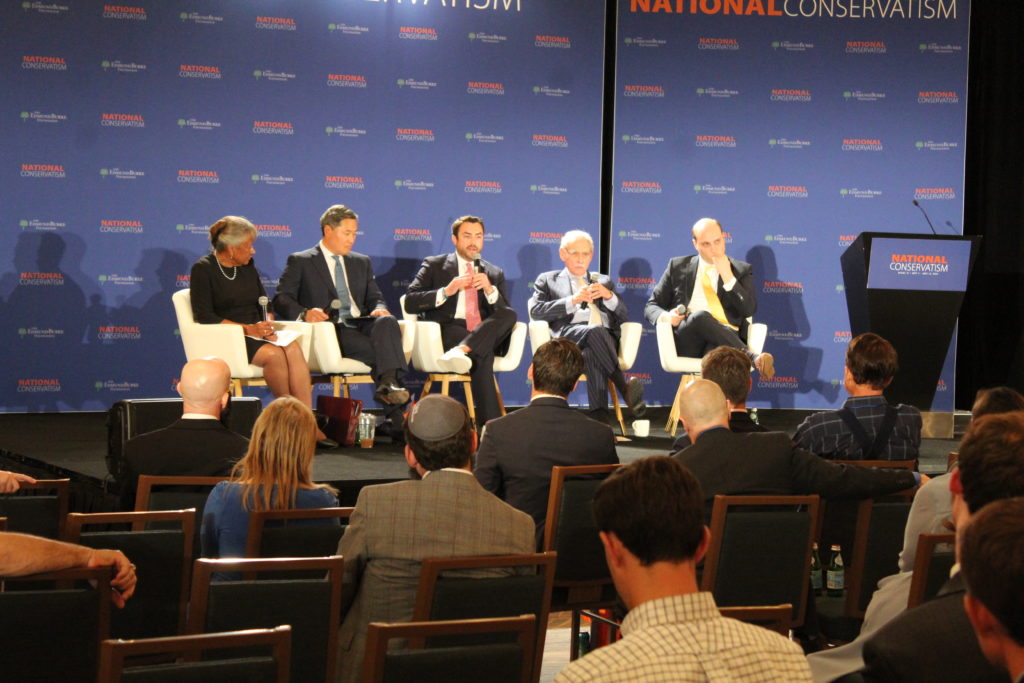
A cavernous conference hall stands adjacent to a hot and humid Miami golf course. A blast of cold air hits you as you open the conference hall doors, perhaps a metaphor for the rush of ideas and individuals you’re about to encounter. The faint sound of a presentation over a microphone and a constant murmur of excited guests fill the chilled air. Speakers, staffers, journalists, and students mill back on forth between the main hall, the breakout rooms, and the hallway connecting the three. Tables, manned by various organizations and covered with printed materials and brochures bump up against makeshift recording studios constructed in the hallway, with the all-important coffee cart in the middle.
The third in the series of National Conservatism Conferences has been well underway for two days now, and the energy shows no signs of slipping. As one of the conference attendees, I’m manning the table for the James Wilson Institute, with an up-close vantage for what’s happening. It’s my first NatCon Conference so I am trying to get my bearings.
The gathering is an odd mix of the well-informed, NatCon faithful (as I am told) who are returning to the conference and an influx of curious “seekers” browsing between booths and panels looking to understand what this new movement is all about. Between these “seekers” and the new statement of National Conservatism Principles, the defining question this conference seeks to answer is “What is National Conservatism?”
National Conservatism appears to arise much as a reaction to other forms of Conservatism. Internal divisions, in our circles among legal conservatives and but also more broadly among political conservatives, have revealed an openness to a new coalition. As such, NatCon features an eclectic group of organizations and speakers, some of whom would not have been welcome even at robust gatherings of conservatives in recent years. Yet others, such as the Heritage Foundation, are so large and prominent that the casual observer could be excused for thinking they are the conservative movement. Yet, there remains the question of what defines these conservatives as a group, apart from simply being “the others.”
The National Conservatism Statement of Principles seems to put forward a few themes for this new coalition to rally around, the most dramatic of being the “National” approach. The group is unapologetically nationalist in its views, affirming a nation-centric perspective on law and politics. Yet, great pains have been taken to clarify that this is not a venue for white nationalism. Indeed, the room is far too diverse for a sense of ethnic nationalism to take hold. Instead, the nationalism of Nat Con has been built around American ideals and cultural memory. Speakers in the halls call for a broad reaffirmation of Judeo-Christian heritage and social mores, exhorting the audiences to have courage in the face of a culture that no longer takes religious practices seriously as having a place in the public square.
Perhaps the second defining feature of the conference is not mentioned in the Statement of Principles yet echoes throughout the halls. From the conference organizers to the attendees, from the table staffers to the speakers, the conversations display an intense appetite for intellectual depth and for sound reasoning. No speaker goes unquestioned, and the conversations sparked during the day continue long into the night at the hotel bar as well. Indeed, two frequent occurrences happen at NatCon I am not sure occur at other conferences nearly as often. First, is encountering someone you’ve read or heard speak elsewhere and engaging with them, in an intimate setting, in-person for the first time. To a person, NatCon attendees and speakers are delighted to enjoy a conference in-full together. But the other occurrence is the happy recognition of a friend that you did not expect to see and bonding over discovering National Conservatism together. The latter happened to me at the most recent conference several times, and it points toward the conference’s deepening resonance.
Beyond anything else conveyed in the speeches or panels, the sheer energy of the conference is immense. Young participants mill about with their seniors, sharing the excitement for something new. Attendees savor the sense of potential and action already beginning to unfold that runs in the air. Something will happen, and something will come of this conference: a new shift in the way conservatives approach the nation or perhaps even a more popular vision that can be cast for the whole movement. This appetite may come as a response to conservative shifts toward populism, as earnest inquirers search out whether there’s deeper substance and coherence underlying conservative populism. Yet, whatever it is that may come of this conference, it will not go unnoticed.
For those wondering what is coming next for conservatives, the work of the Edmund Burke Foundation seems to already be carving a path. The question of if it succeeds or fails will simply be if they can define their own movement well enough to rally others around it.


